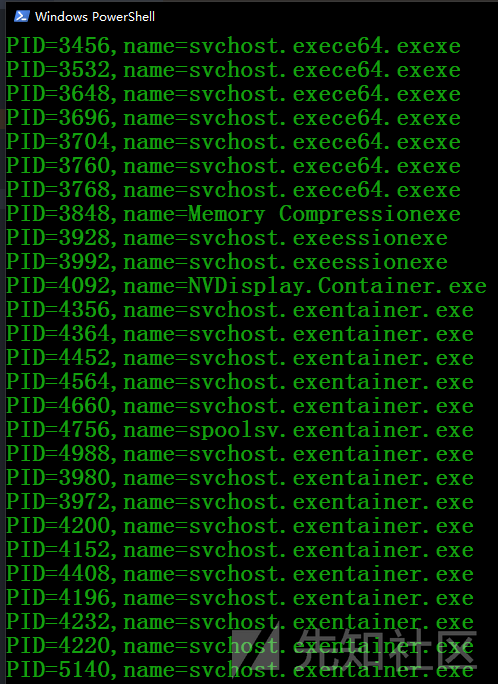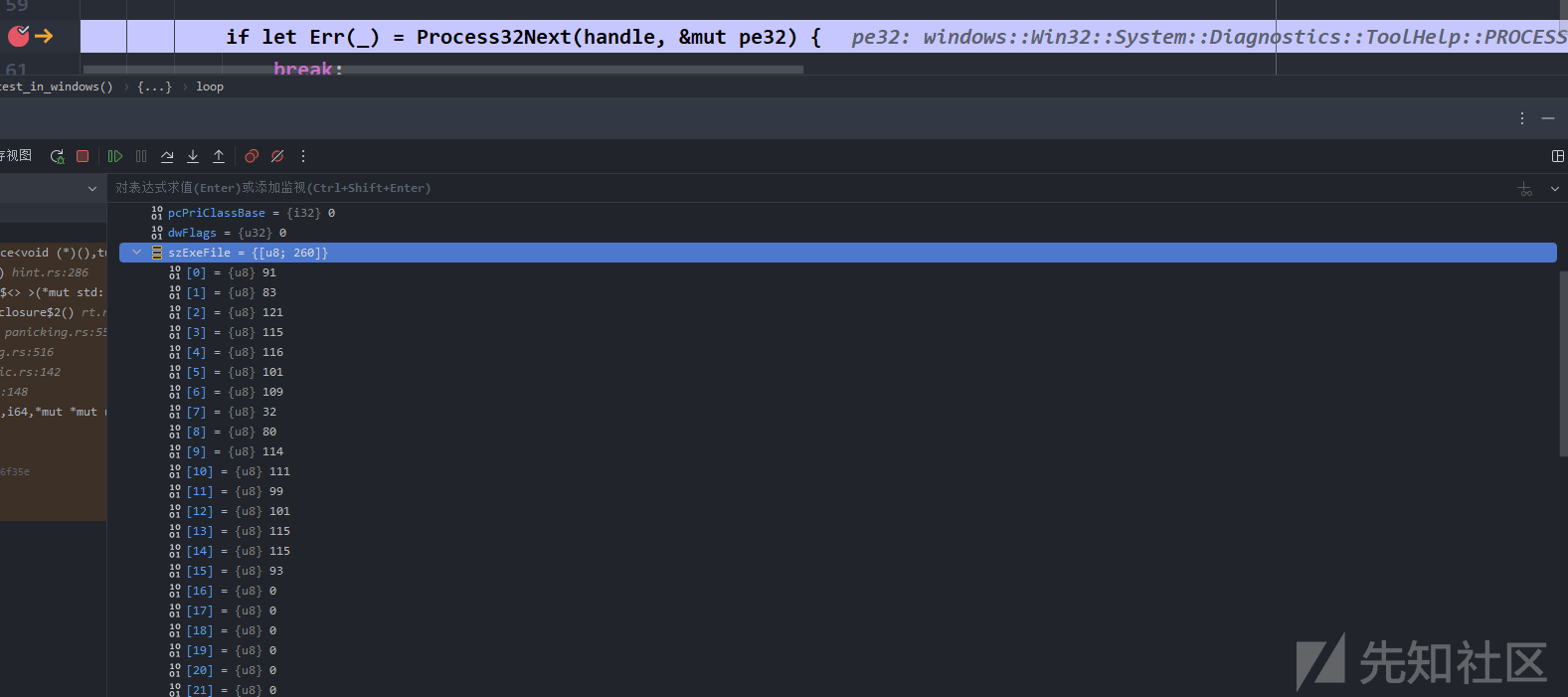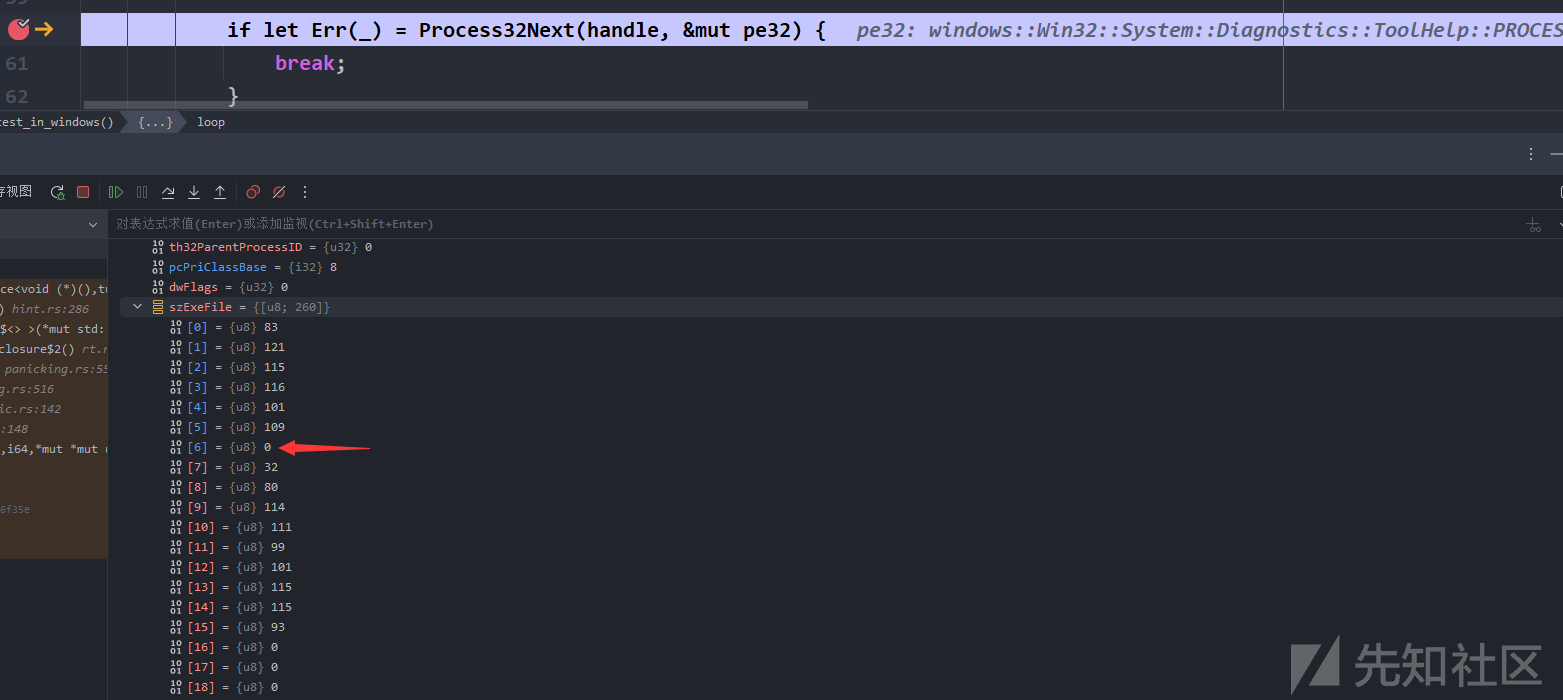Rust是这两年比较火的一门语言,作为新研发的系统级编程语言。用Rust写出来的程序不仅运行速度快,还通过所有权系统等对代码进行编译时检查,有效地提升了程序的安全性,降低了bug率。
通过Rust调用Windows API需要使用相应的包(crate)来实现,几年前有一个winapi 包可以做这件事。不过这个包已经好久没有更新了,微软官方最近则提供了windows 和 windows-rs 这两个crate供大家使用。
本文将展示通过windows和windows-rs这两个crate来调用Windows API并实现进程遍历,并打印每个进程的PID和进程名的功能。
windows和windows-rs的区别
这两个crate都可以用来调用Windows API,两者的区别可以看Choosing between the windows and windows-sys crates - Kenny Kerr 中的介绍,大概如下。对于本文来说,最主要的是第四点区别,也就是用windows这个crate写出来的代码更有Rust的风格,而用windows-rs写出来的代码看起来和C/C++没什么区别。

之所以会这样,是因为windows-rs这个crate没有对Windows API进行封装,而是直接从kernel32.dll中获取然后调用:
#[cfg(feature = "Win32_Foundation")]
::windows_targets::link!("kernel32.dll" "system" #[doc = "Required features: `\"Win32_Foundation\"`"] fn CreateToolhelp32Snapshot(dwflags : CREATE_TOOLHELP_SNAPSHOT_FLAGS, th32processid : u32) -> super::super::super::Foundation:: HANDLE);
但是windows这个crate则会对API进行简单的封装,让函数的返回值符合Rust的风格:
#[inline]
pub unsafe fn CreateToolhelp32Snapshot(dwflags: CREATE_TOOLHELP_SNAPSHOT_FLAGS, th32processid: u32) -> ::windows_core::Result<super::super::super::Foundation::HANDLE> {
::windows_targets::link!("kernel32.dll" "system" fn CreateToolhelp32Snapshot(dwflags : CREATE_TOOLHELP_SNAPSHOT_FLAGS, th32processid : u32) -> super::super::super::Foundation:: HANDLE);
let result__ = CreateToolhelp32Snapshot(dwflags, th32processid);
(!result__.is_invalid()).then(|| result__).ok_or_else(::windows_core::Error::from_win32)
}
所以从crate.io中查询道到函数定义上看,这两个函数除了返回值,其他都一样,并且都和原生API一样:


代码实现
首先,需要在Cargo.toml中引入这两个包,之后才能使用这里面的函数:
[dependencies.windows]
version = "*"
features = [
"Win32_Foundation",
"Win32_System_Diagnostics_ToolHelp",
]
[dependencies.windows-sys]
version = "*"
features = [
"Win32_Foundation",
"Win32_System_Diagnostics_ToolHelp",
]
其次,由于这些Windows API基本上都是用unsafe声明的,所以要调用这些API需要在Rust的unsafe块中调用。
如果使用windows-rs来实现进程遍历,写出来的代码基本和用C/C++写出来的代码没什么区别,都是获取进程快照,然后循环获取每个进程的PID和进程名:
fn test_in_windows_sys() {
use windows_sys::Win32::Foundation::{INVALID_HANDLE_VALUE, GetLastError};
use windows_sys::Win32::System::Diagnostics::ToolHelp::{CreateToolhelp32Snapshot, Process32First, Process32Next, PROCESSENTRY32,TH32CS_SNAPPROCESS};
unsafe {
// 获取进程快照
let handle = CreateToolhelp32Snapshot(TH32CS_SNAPPROCESS, 0);
if handle == INVALID_HANDLE_VALUE {
println!("CreateToolhelp32Snapshot Error: {}", GetLastError());
process::exit(1);
}
let mut pe32: PROCESSENTRY32 = zeroed();
pe32.dwSize = size_of_val(&pe32) as u32;
let mut b_ret = Process32First(handle, &mut pe32) != 0;
while b_ret {
// 将进程名转换为UTF-8
let name = String::from_utf8(pe32.szExeFile[..].to_vec()).unwrap_or_else(|e| {
println!("String::from_utf8 Error: {}", e);
process::exit(1);
});
println!("PID={},name={}", pe32.th32ProcessID, name);
b_ret = Process32Next(handle, &mut pe32) != 0;
}
}
}
如果是使用windows这个包来实现,方法也是一样,只不过要对返回值进行处理,写出来的代码就具有Rust风格:
fn test_in_windows() {
use windows::Win32::System::Diagnostics::ToolHelp::{CreateToolhelp32Snapshot, Process32First, Process32Next, PROCESSENTRY32, TH32CS_SNAPPROCESS};
unsafe {
let handle = CreateToolhelp32Snapshot(TH32CS_SNAPPROCESS, 0).unwrap_or_else(|e| {
println!("CreateToolhelp32Snapshot Error: {}", e);
process::exit(1);
});
let mut pe32: PROCESSENTRY32 = PROCESSENTRY32::default();
pe32.dwSize = size_of_val(&pe32) as u32;
Process32First(handle, &mut pe32).unwrap_or_else(|e| {
println!("Process32First Error: {}", e);
process::exit(1);
});
loop {
// 将进程名转换为UTF-8
let sz_exe_file = pe32.szExeFile.map(|x| x as u8).to_vec();
let name = String::from_utf8(sz_exe_file).unwrap_or_else(|e| {
println!("String::from_utf8 Error: {}", e);
process::exit(1);
});
println!("PID={},name={}", pe32.th32ProcessID, name);
if let Err(_) = Process32Next(handle, &mut pe32) {
break;
}
}
}
}
编码问题
上面两段代码,无论哪段代码运行以后,进程名的输出都是像下面这样出错:

这是因为,在Rust中字符是按UTF-8编码的,而Process32First和Process32Next这两个API都是按照ASCII编码来将进程名字写入到PROCESSENTRY32->szExeFile数组中,所以在获取进程名的时候,都需要通过String::from_utf8来转换:
let name = String::from_utf8(sz_exe_file).unwrap_or_else(|e| {
println!("String::from_utf8 Error: {}", e);
process::exit(1);
});
然而,Process32First和Process32Next在将进程名写入到szExeFile数组的时候并没有清空该数组。
以下是调试的结果:
首先在第一次运行Process32Next函数之前,Process32First函数会将第一个进程名写入到szExeFile数组中。该进程名共16个字节,所以szExeFile[0]到szExeFile[15]就保存了这个进程的名称:

当第二次准备运行Process32Next函数的时候,该函数已经把第二个进程的名称写入到szExeFile数组中,第二个进程名共6个字节,所以szExeFile[0]到szExeFile[5]就保存了第二个进程的名称。

但是,Process32Next函数在写入第二个进程名的时候没有清空szExeFile数组,而是直接将szExeFile[6]赋值为0,以此来截断字符。这就导致szExeFile[7]到szExeFile[15]中保存了上一个进程名的数据。
由此可以推测,Process32First和Process32Next这两个函数在写入进程名称的时候,逻辑大概如下所示,也就是直接将新的进程的进程名写入到数组中,然后在后面加个0截断,而没有去清空szExeFile数组。
void write_process_name(char szExeFile[], char newProName[]) {
DWORD dwProNameLen = strlen(newProName);
for (DWORD i = 0; i < dwProNameLen; i++) {
szExeFile[i] = newProName[i];
}
szExeFile[dwProNameLen] = 0;
}
虽然这样写不合适,不过你如果用ASCII来编码szExeFile程序是可以正常输出的。但问题是,Rust是用UTF-8来编码的。这个时候,程序不会将szExeFile[6]中的0当成是字符串结束,而是继续向后编码,直到遇到连续的两个0,这就产生了上面说的输出进程名出现的错误。
要解决这个问题也不难,在这个程序中只要在调用Process32Next函数之前,自己手动将szExeFile数组清空即可:
for item in pe32.szExeFile.iter_mut() {
*item = 0;
}
这个时候就会发现,程序的输出是正常的:
后记
这个字符编码问题怎么说呢,应该说是Process32First/Process32Next函数这两个原生API的问题。按道理不应该那样去写入进程名,不知道最开始为什么要这样去写代码,可能是为了快?
而且,如果Process32First/Process32Next函数有这个问题,其他的比如Module32First/Module32Next这些函数也肯定会有这个问题。但是坑的地方是,windows和windows-rs这两个包没有在crate-io中说明这个问题。而如果按照MSDN的定义,程序员是不会想到要去特别处理这一块代码。
所以可想而知,这样就很容易出现很多Bug。windows和windows-rs作为crate,按道理在封装的时候应该对这些代码进行处理,不然你也得在crate-io中进行说明。可是什么都没有,我已经把这个问题在github上向这两个crate的开发人员进行反馈了反馈:Unable to get the correct process name by using Process32First/Process32Next function · Issue #2879 · microsoft/windows-rs · GitHub
但是目前得到的回复是:
There doesn't appear to be any bug here. Your program owns the
PROCESSENTRY32structure and is responsible for ensuring it's ready before callingProcess32Next.I don't think we want to do this at the crate level for a number of reasons, such as:
- The crate is automatically generated from metadata and there's no metadata to indicate which buffers should be zeroed before call
- Zeroing out the struct member automatically could be wasteful if the user already zeroed it out
- The caller may want to provide a
szExeFilepadded out with0x20(space) charactersI'll leave this open for others to chime in, just in case I'm missing something.
大概意思就是要程序员们自己注意,调这些函数的时候多想想,相应结构体有没有被你合理的赋值。
(不得不说这个锅甩的一言难尽,希望之后这两个包在迭代过程中会有所修改吧,不然真的是要带一堆BUG出来)

 转载
转载
 分享
分享

